University of Suffolk: International Business Report
VerifiedAdded on 2022/12/27
|12
|3530
|59
Report
AI Summary
This report offers a comprehensive analysis of international business, primarily focusing on the World Trade Organization (WTO). It begins with an executive summary and an introduction to international business, defining its scope and significance. The main body of the report includes a literature review, followed by an analysis of the motivations behind the formation of the WTO, examining its key functions and evaluating its significance in global trade. The report also explores the challenges faced by the WTO in achieving its objectives, analyzes the effectiveness of WTO policies through relevant examples, and discusses how specific organizations and industries are affected. The report concludes with recommendations and a conclusion, supported by a list of references. The report covers various aspects of international business, including trade agreements, tariffs, and the impact of global policies on businesses.
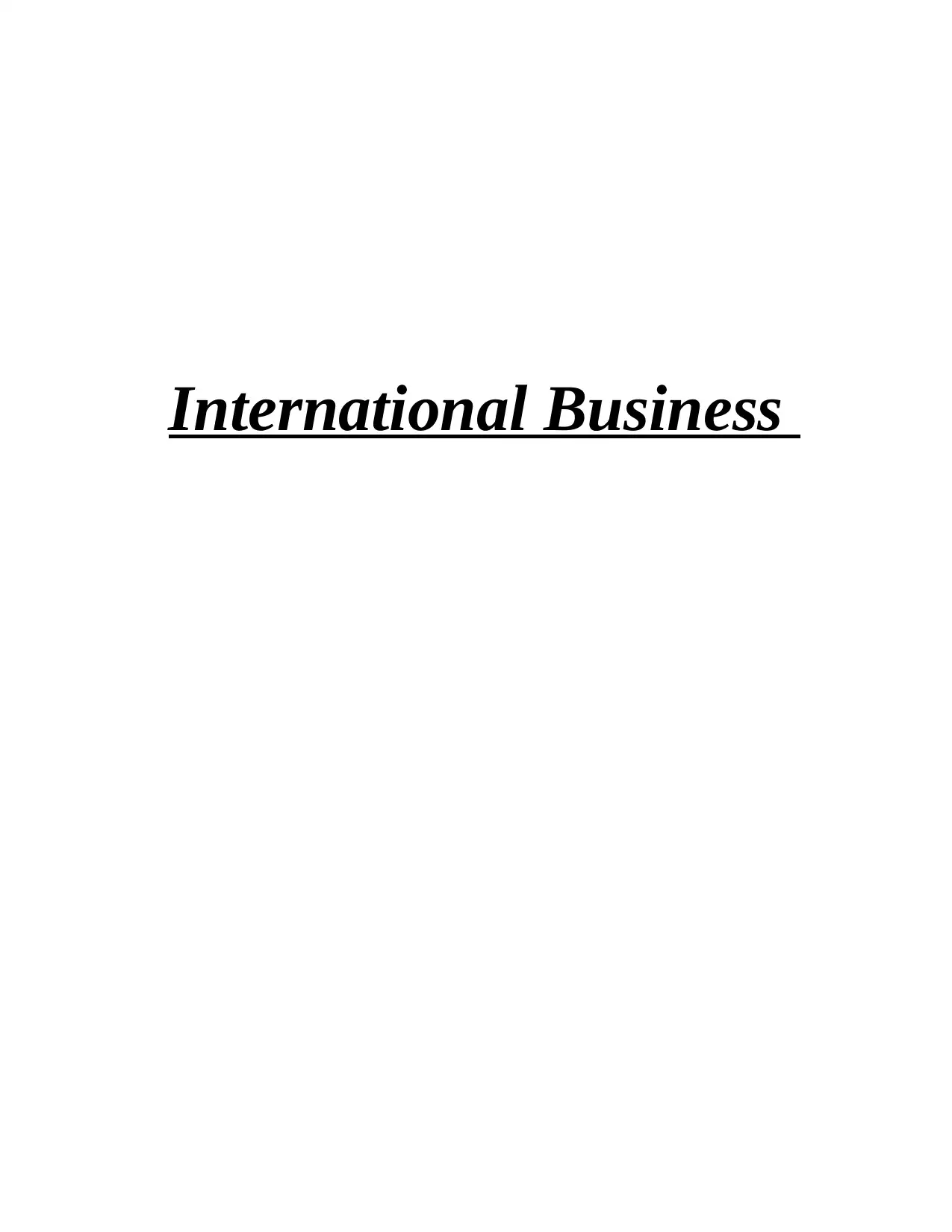
International Business
Paraphrase This Document
Need a fresh take? Get an instant paraphrase of this document with our AI Paraphraser
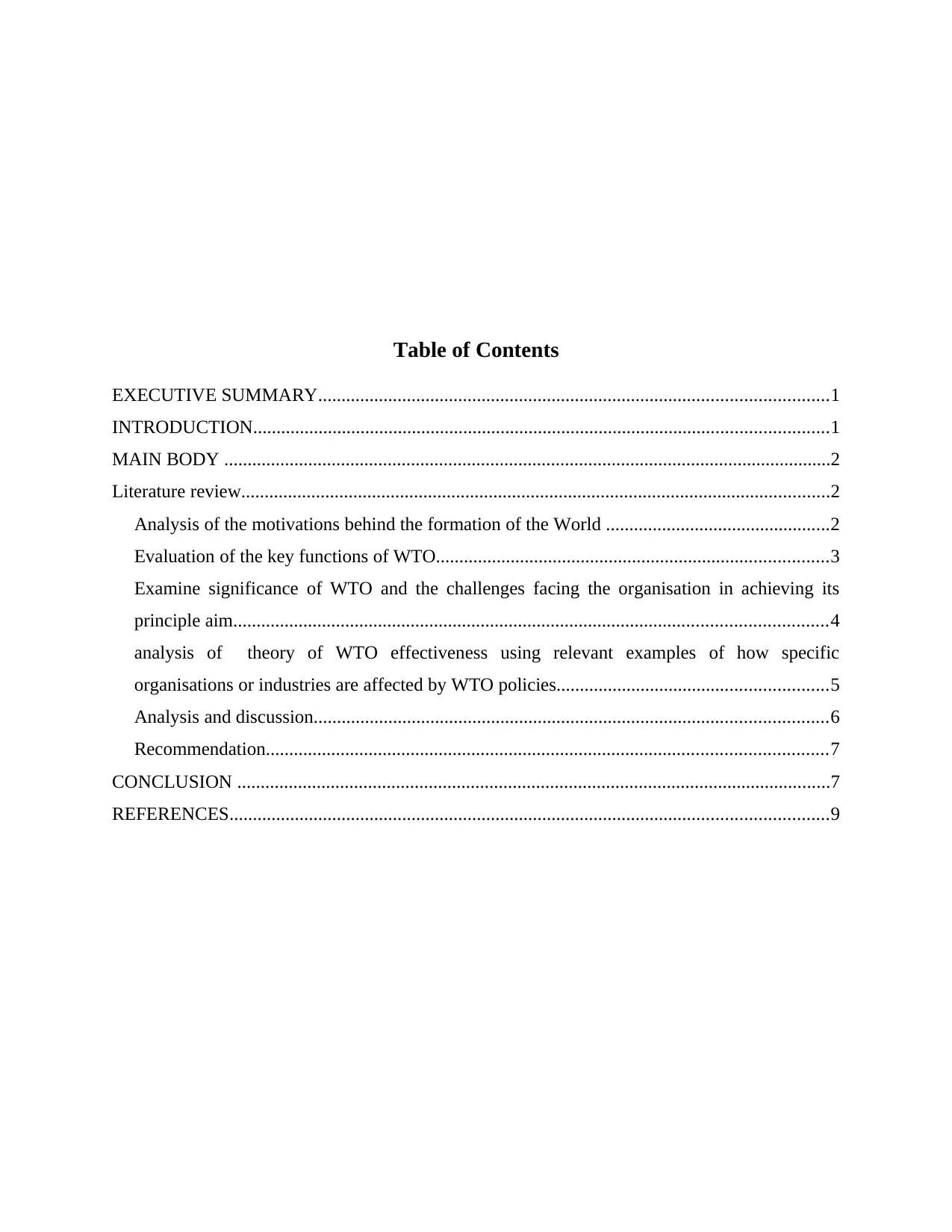
Table of Contents
EXECUTIVE SUMMARY.............................................................................................................1
INTRODUCTION...........................................................................................................................1
MAIN BODY ..................................................................................................................................2
Literature review..............................................................................................................................2
Analysis of the motivations behind the formation of the World ................................................2
Evaluation of the key functions of WTO....................................................................................3
Examine significance of WTO and the challenges facing the organisation in achieving its
principle aim...............................................................................................................................4
analysis of theory of WTO effectiveness using relevant examples of how specific
organisations or industries are affected by WTO policies..........................................................5
Analysis and discussion..............................................................................................................6
Recommendation........................................................................................................................7
CONCLUSION ...............................................................................................................................7
REFERENCES................................................................................................................................9
EXECUTIVE SUMMARY.............................................................................................................1
INTRODUCTION...........................................................................................................................1
MAIN BODY ..................................................................................................................................2
Literature review..............................................................................................................................2
Analysis of the motivations behind the formation of the World ................................................2
Evaluation of the key functions of WTO....................................................................................3
Examine significance of WTO and the challenges facing the organisation in achieving its
principle aim...............................................................................................................................4
analysis of theory of WTO effectiveness using relevant examples of how specific
organisations or industries are affected by WTO policies..........................................................5
Analysis and discussion..............................................................................................................6
Recommendation........................................................................................................................7
CONCLUSION ...............................................................................................................................7
REFERENCES................................................................................................................................9
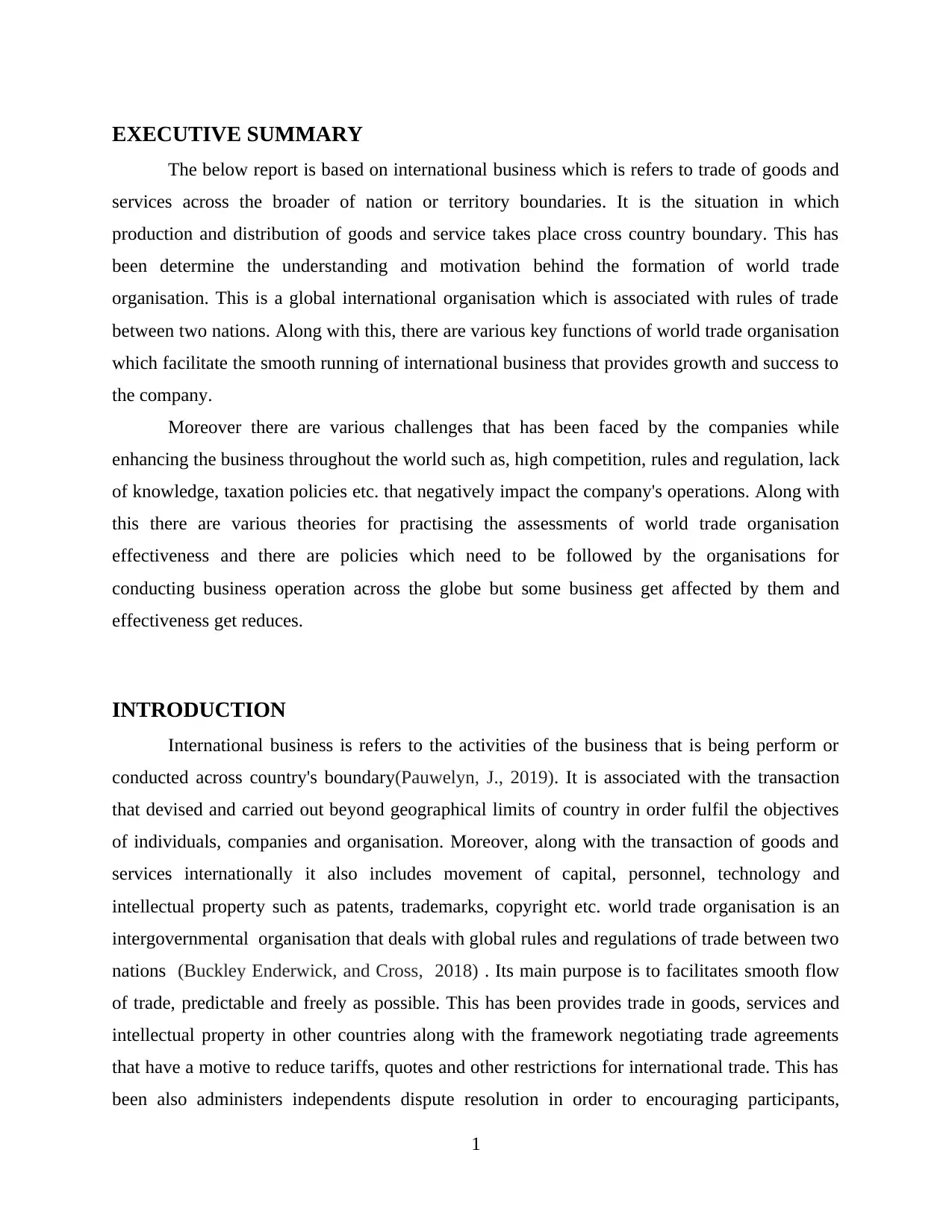
EXECUTIVE SUMMARY
The below report is based on international business which is refers to trade of goods and
services across the broader of nation or territory boundaries. It is the situation in which
production and distribution of goods and service takes place cross country boundary. This has
been determine the understanding and motivation behind the formation of world trade
organisation. This is a global international organisation which is associated with rules of trade
between two nations. Along with this, there are various key functions of world trade organisation
which facilitate the smooth running of international business that provides growth and success to
the company.
Moreover there are various challenges that has been faced by the companies while
enhancing the business throughout the world such as, high competition, rules and regulation, lack
of knowledge, taxation policies etc. that negatively impact the company's operations. Along with
this there are various theories for practising the assessments of world trade organisation
effectiveness and there are policies which need to be followed by the organisations for
conducting business operation across the globe but some business get affected by them and
effectiveness get reduces.
INTRODUCTION
International business is refers to the activities of the business that is being perform or
conducted across country's boundary(Pauwelyn, J., 2019). It is associated with the transaction
that devised and carried out beyond geographical limits of country in order fulfil the objectives
of individuals, companies and organisation. Moreover, along with the transaction of goods and
services internationally it also includes movement of capital, personnel, technology and
intellectual property such as patents, trademarks, copyright etc. world trade organisation is an
intergovernmental organisation that deals with global rules and regulations of trade between two
nations (Buckley Enderwick, and Cross, 2018) . Its main purpose is to facilitates smooth flow
of trade, predictable and freely as possible. This has been provides trade in goods, services and
intellectual property in other countries along with the framework negotiating trade agreements
that have a motive to reduce tariffs, quotes and other restrictions for international trade. This has
been also administers independents dispute resolution in order to encouraging participants,
1
The below report is based on international business which is refers to trade of goods and
services across the broader of nation or territory boundaries. It is the situation in which
production and distribution of goods and service takes place cross country boundary. This has
been determine the understanding and motivation behind the formation of world trade
organisation. This is a global international organisation which is associated with rules of trade
between two nations. Along with this, there are various key functions of world trade organisation
which facilitate the smooth running of international business that provides growth and success to
the company.
Moreover there are various challenges that has been faced by the companies while
enhancing the business throughout the world such as, high competition, rules and regulation, lack
of knowledge, taxation policies etc. that negatively impact the company's operations. Along with
this there are various theories for practising the assessments of world trade organisation
effectiveness and there are policies which need to be followed by the organisations for
conducting business operation across the globe but some business get affected by them and
effectiveness get reduces.
INTRODUCTION
International business is refers to the activities of the business that is being perform or
conducted across country's boundary(Pauwelyn, J., 2019). It is associated with the transaction
that devised and carried out beyond geographical limits of country in order fulfil the objectives
of individuals, companies and organisation. Moreover, along with the transaction of goods and
services internationally it also includes movement of capital, personnel, technology and
intellectual property such as patents, trademarks, copyright etc. world trade organisation is an
intergovernmental organisation that deals with global rules and regulations of trade between two
nations (Buckley Enderwick, and Cross, 2018) . Its main purpose is to facilitates smooth flow
of trade, predictable and freely as possible. This has been provides trade in goods, services and
intellectual property in other countries along with the framework negotiating trade agreements
that have a motive to reduce tariffs, quotes and other restrictions for international trade. This has
been also administers independents dispute resolution in order to encouraging participants,
1
⊘ This is a preview!⊘
Do you want full access?
Subscribe today to unlock all pages.

Trusted by 1+ million students worldwide
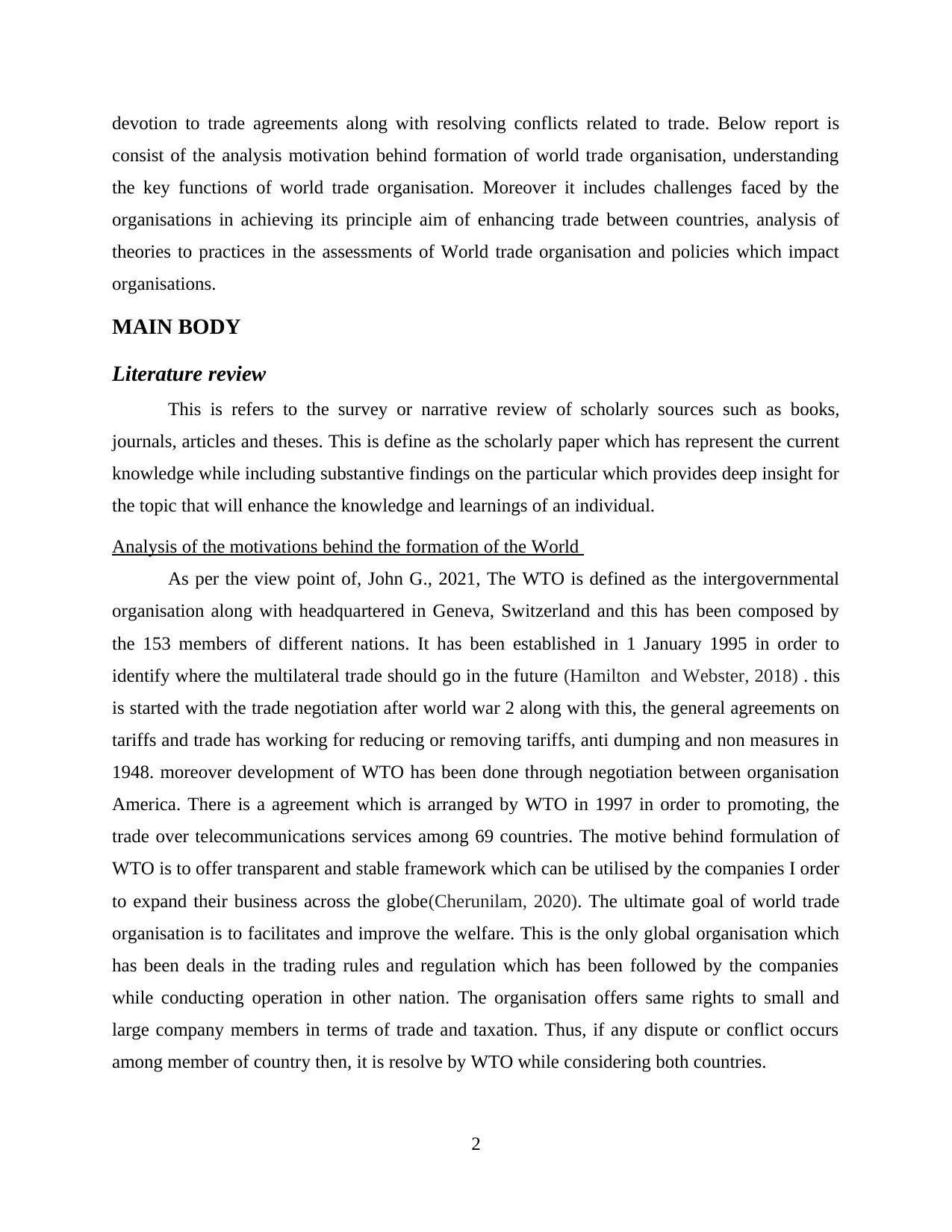
devotion to trade agreements along with resolving conflicts related to trade. Below report is
consist of the analysis motivation behind formation of world trade organisation, understanding
the key functions of world trade organisation. Moreover it includes challenges faced by the
organisations in achieving its principle aim of enhancing trade between countries, analysis of
theories to practices in the assessments of World trade organisation and policies which impact
organisations.
MAIN BODY
Literature review
This is refers to the survey or narrative review of scholarly sources such as books,
journals, articles and theses. This is define as the scholarly paper which has represent the current
knowledge while including substantive findings on the particular which provides deep insight for
the topic that will enhance the knowledge and learnings of an individual.
Analysis of the motivations behind the formation of the World
As per the view point of, John G., 2021, The WTO is defined as the intergovernmental
organisation along with headquartered in Geneva, Switzerland and this has been composed by
the 153 members of different nations. It has been established in 1 January 1995 in order to
identify where the multilateral trade should go in the future (Hamilton and Webster, 2018) . this
is started with the trade negotiation after world war 2 along with this, the general agreements on
tariffs and trade has working for reducing or removing tariffs, anti dumping and non measures in
1948. moreover development of WTO has been done through negotiation between organisation
America. There is a agreement which is arranged by WTO in 1997 in order to promoting, the
trade over telecommunications services among 69 countries. The motive behind formulation of
WTO is to offer transparent and stable framework which can be utilised by the companies I order
to expand their business across the globe(Cherunilam, 2020). The ultimate goal of world trade
organisation is to facilitates and improve the welfare. This is the only global organisation which
has been deals in the trading rules and regulation which has been followed by the companies
while conducting operation in other nation. The organisation offers same rights to small and
large company members in terms of trade and taxation. Thus, if any dispute or conflict occurs
among member of country then, it is resolve by WTO while considering both countries.
2
consist of the analysis motivation behind formation of world trade organisation, understanding
the key functions of world trade organisation. Moreover it includes challenges faced by the
organisations in achieving its principle aim of enhancing trade between countries, analysis of
theories to practices in the assessments of World trade organisation and policies which impact
organisations.
MAIN BODY
Literature review
This is refers to the survey or narrative review of scholarly sources such as books,
journals, articles and theses. This is define as the scholarly paper which has represent the current
knowledge while including substantive findings on the particular which provides deep insight for
the topic that will enhance the knowledge and learnings of an individual.
Analysis of the motivations behind the formation of the World
As per the view point of, John G., 2021, The WTO is defined as the intergovernmental
organisation along with headquartered in Geneva, Switzerland and this has been composed by
the 153 members of different nations. It has been established in 1 January 1995 in order to
identify where the multilateral trade should go in the future (Hamilton and Webster, 2018) . this
is started with the trade negotiation after world war 2 along with this, the general agreements on
tariffs and trade has working for reducing or removing tariffs, anti dumping and non measures in
1948. moreover development of WTO has been done through negotiation between organisation
America. There is a agreement which is arranged by WTO in 1997 in order to promoting, the
trade over telecommunications services among 69 countries. The motive behind formulation of
WTO is to offer transparent and stable framework which can be utilised by the companies I order
to expand their business across the globe(Cherunilam, 2020). The ultimate goal of world trade
organisation is to facilitates and improve the welfare. This is the only global organisation which
has been deals in the trading rules and regulation which has been followed by the companies
while conducting operation in other nation. The organisation offers same rights to small and
large company members in terms of trade and taxation. Thus, if any dispute or conflict occurs
among member of country then, it is resolve by WTO while considering both countries.
2
Paraphrase This Document
Need a fresh take? Get an instant paraphrase of this document with our AI Paraphraser

Evaluation of the key functions of WTO.
As per the view point of, Kym Anderson, 2021. world trade organisation is associated
with the global rules for trade that takes place two nations. There are various functions that has
been administering the trade agreements that has to be followed by the organisation through
which company ensures the smooth running of its operations (Chi, and. et. al., 2019).
It has been act as the forum for the trade negotiation which brings government, non-
government organisations, academic, business and other stakeholder together in order to
discuss wide range of issues pertaining inclusively to the digital economy of member
nations.
This has a function of developing and reviewing national trade policies which provides
right directions for the accomplishment of goals. Moreover, it also assisting developing
countries regarding trade policy issue with the support of technical assistance and training
programmes. Through which ensures the effective trade policies and solutions for the
trade issues through which organisation ensures, smooth running operations and function.
WTO corporate with other international organisation through which better facilities can
be provided to nations members trough which they obtained desired outcomes, goals and
objectives. In addition to this, the goal is to provides support to the manufacturers of
goods and services, exporters and importers so that they can conduct their business
operations across the globe in order to obtain growth.
The WTO facilitate smooth flow of trade and predictable along with it provides forum
while concerning multilateral trade relation between members (Eden, Nielsen, and
Verbeke, 2020) .
The WTO is covers all commodity, services and intellectual property, they has been
outline the principles of liberalization and the permitted exceptions. They considered
individual countries and commitments for the low custom tariffs and reduce other barriers
and keep markets open for the other organisations. They has been continue with the
renegotiate in stipulated period of time so that new agreements can be added to package.
The WTO process for resolving trade conflicts under the dispute settlement which is need
to understand in order to enforcing the the rules and to ensures the trade flow effectively
and smoothly. The agreements under WTO contains special provision for the developing
countries. it involves implementing of agreements and commitments for longer period of
3
As per the view point of, Kym Anderson, 2021. world trade organisation is associated
with the global rules for trade that takes place two nations. There are various functions that has
been administering the trade agreements that has to be followed by the organisation through
which company ensures the smooth running of its operations (Chi, and. et. al., 2019).
It has been act as the forum for the trade negotiation which brings government, non-
government organisations, academic, business and other stakeholder together in order to
discuss wide range of issues pertaining inclusively to the digital economy of member
nations.
This has a function of developing and reviewing national trade policies which provides
right directions for the accomplishment of goals. Moreover, it also assisting developing
countries regarding trade policy issue with the support of technical assistance and training
programmes. Through which ensures the effective trade policies and solutions for the
trade issues through which organisation ensures, smooth running operations and function.
WTO corporate with other international organisation through which better facilities can
be provided to nations members trough which they obtained desired outcomes, goals and
objectives. In addition to this, the goal is to provides support to the manufacturers of
goods and services, exporters and importers so that they can conduct their business
operations across the globe in order to obtain growth.
The WTO facilitate smooth flow of trade and predictable along with it provides forum
while concerning multilateral trade relation between members (Eden, Nielsen, and
Verbeke, 2020) .
The WTO is covers all commodity, services and intellectual property, they has been
outline the principles of liberalization and the permitted exceptions. They considered
individual countries and commitments for the low custom tariffs and reduce other barriers
and keep markets open for the other organisations. They has been continue with the
renegotiate in stipulated period of time so that new agreements can be added to package.
The WTO process for resolving trade conflicts under the dispute settlement which is need
to understand in order to enforcing the the rules and to ensures the trade flow effectively
and smoothly. The agreements under WTO contains special provision for the developing
countries. it involves implementing of agreements and commitments for longer period of
3
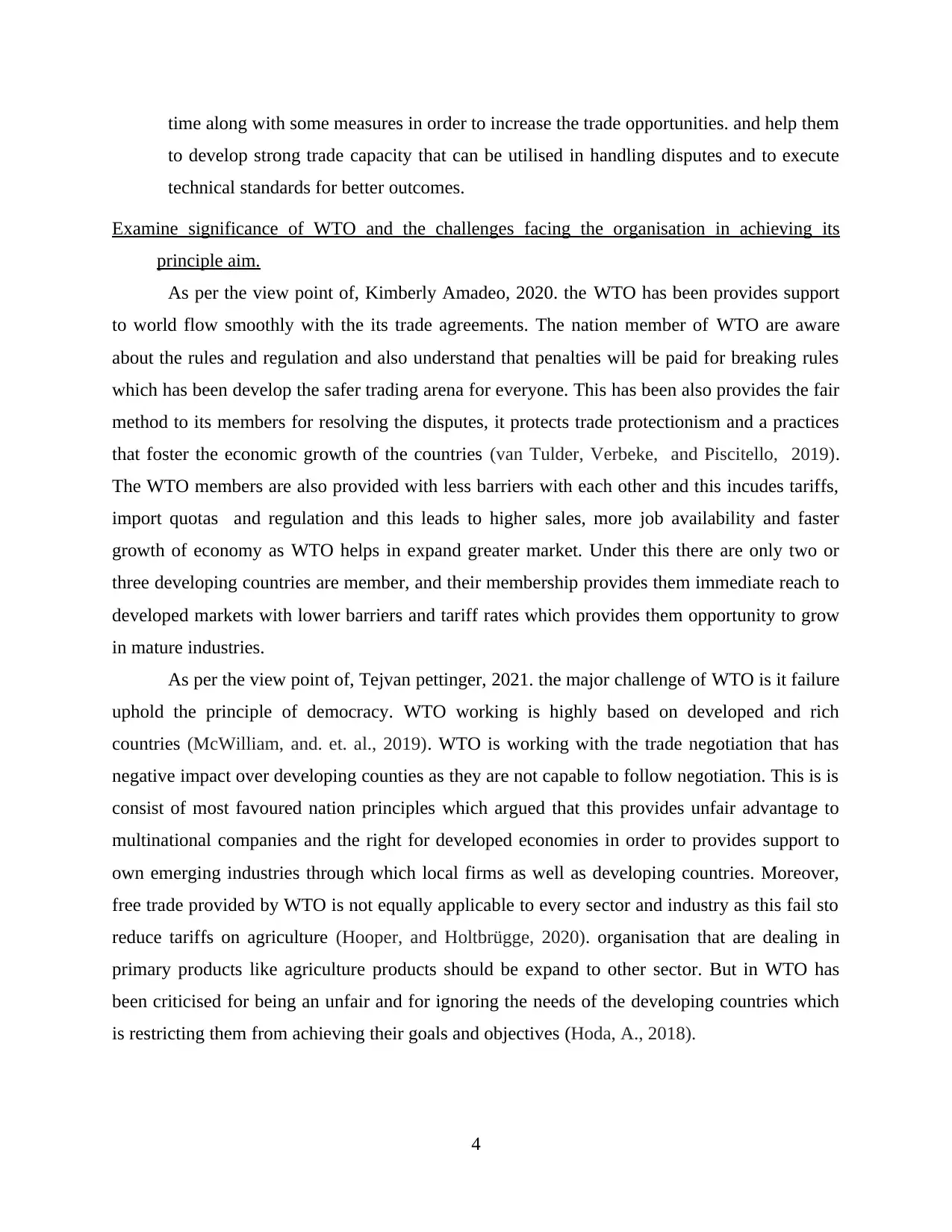
time along with some measures in order to increase the trade opportunities. and help them
to develop strong trade capacity that can be utilised in handling disputes and to execute
technical standards for better outcomes.
Examine significance of WTO and the challenges facing the organisation in achieving its
principle aim.
As per the view point of, Kimberly Amadeo, 2020. the WTO has been provides support
to world flow smoothly with the its trade agreements. The nation member of WTO are aware
about the rules and regulation and also understand that penalties will be paid for breaking rules
which has been develop the safer trading arena for everyone. This has been also provides the fair
method to its members for resolving the disputes, it protects trade protectionism and a practices
that foster the economic growth of the countries (van Tulder, Verbeke, and Piscitello, 2019).
The WTO members are also provided with less barriers with each other and this incudes tariffs,
import quotas and regulation and this leads to higher sales, more job availability and faster
growth of economy as WTO helps in expand greater market. Under this there are only two or
three developing countries are member, and their membership provides them immediate reach to
developed markets with lower barriers and tariff rates which provides them opportunity to grow
in mature industries.
As per the view point of, Tejvan pettinger, 2021. the major challenge of WTO is it failure
uphold the principle of democracy. WTO working is highly based on developed and rich
countries (McWilliam, and. et. al., 2019). WTO is working with the trade negotiation that has
negative impact over developing counties as they are not capable to follow negotiation. This is is
consist of most favoured nation principles which argued that this provides unfair advantage to
multinational companies and the right for developed economies in order to provides support to
own emerging industries through which local firms as well as developing countries. Moreover,
free trade provided by WTO is not equally applicable to every sector and industry as this fail sto
reduce tariffs on agriculture (Hooper, and Holtbrügge, 2020). organisation that are dealing in
primary products like agriculture products should be expand to other sector. But in WTO has
been criticised for being an unfair and for ignoring the needs of the developing countries which
is restricting them from achieving their goals and objectives (Hoda, A., 2018).
4
to develop strong trade capacity that can be utilised in handling disputes and to execute
technical standards for better outcomes.
Examine significance of WTO and the challenges facing the organisation in achieving its
principle aim.
As per the view point of, Kimberly Amadeo, 2020. the WTO has been provides support
to world flow smoothly with the its trade agreements. The nation member of WTO are aware
about the rules and regulation and also understand that penalties will be paid for breaking rules
which has been develop the safer trading arena for everyone. This has been also provides the fair
method to its members for resolving the disputes, it protects trade protectionism and a practices
that foster the economic growth of the countries (van Tulder, Verbeke, and Piscitello, 2019).
The WTO members are also provided with less barriers with each other and this incudes tariffs,
import quotas and regulation and this leads to higher sales, more job availability and faster
growth of economy as WTO helps in expand greater market. Under this there are only two or
three developing countries are member, and their membership provides them immediate reach to
developed markets with lower barriers and tariff rates which provides them opportunity to grow
in mature industries.
As per the view point of, Tejvan pettinger, 2021. the major challenge of WTO is it failure
uphold the principle of democracy. WTO working is highly based on developed and rich
countries (McWilliam, and. et. al., 2019). WTO is working with the trade negotiation that has
negative impact over developing counties as they are not capable to follow negotiation. This is is
consist of most favoured nation principles which argued that this provides unfair advantage to
multinational companies and the right for developed economies in order to provides support to
own emerging industries through which local firms as well as developing countries. Moreover,
free trade provided by WTO is not equally applicable to every sector and industry as this fail sto
reduce tariffs on agriculture (Hooper, and Holtbrügge, 2020). organisation that are dealing in
primary products like agriculture products should be expand to other sector. But in WTO has
been criticised for being an unfair and for ignoring the needs of the developing countries which
is restricting them from achieving their goals and objectives (Hoda, A., 2018).
4
⊘ This is a preview!⊘
Do you want full access?
Subscribe today to unlock all pages.

Trusted by 1+ million students worldwide
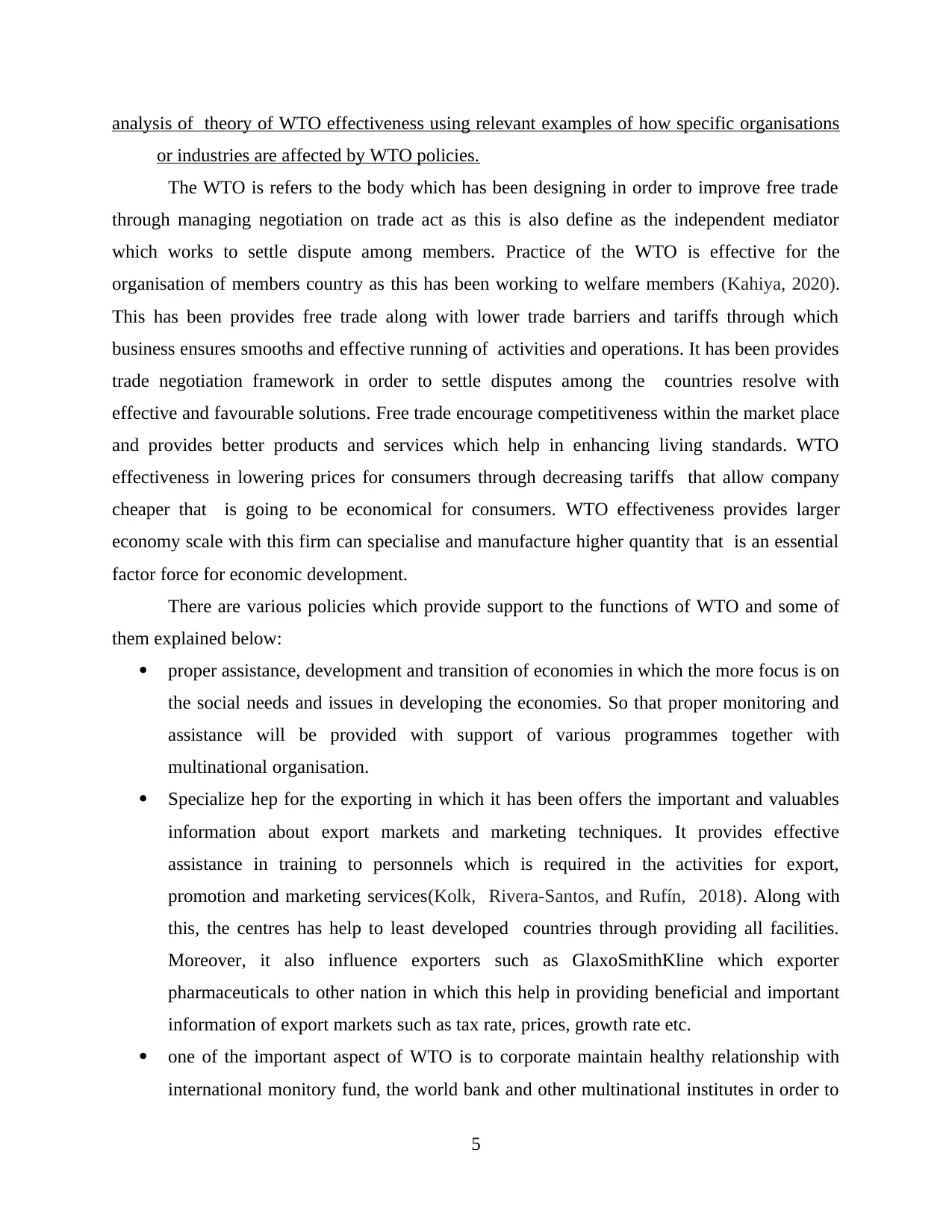
analysis of theory of WTO effectiveness using relevant examples of how specific organisations
or industries are affected by WTO policies.
The WTO is refers to the body which has been designing in order to improve free trade
through managing negotiation on trade act as this is also define as the independent mediator
which works to settle dispute among members. Practice of the WTO is effective for the
organisation of members country as this has been working to welfare members (Kahiya, 2020).
This has been provides free trade along with lower trade barriers and tariffs through which
business ensures smooths and effective running of activities and operations. It has been provides
trade negotiation framework in order to settle disputes among the countries resolve with
effective and favourable solutions. Free trade encourage competitiveness within the market place
and provides better products and services which help in enhancing living standards. WTO
effectiveness in lowering prices for consumers through decreasing tariffs that allow company
cheaper that is going to be economical for consumers. WTO effectiveness provides larger
economy scale with this firm can specialise and manufacture higher quantity that is an essential
factor force for economic development.
There are various policies which provide support to the functions of WTO and some of
them explained below:
proper assistance, development and transition of economies in which the more focus is on
the social needs and issues in developing the economies. So that proper monitoring and
assistance will be provided with support of various programmes together with
multinational organisation.
Specialize hep for the exporting in which it has been offers the important and valuables
information about export markets and marketing techniques. It provides effective
assistance in training to personnels which is required in the activities for export,
promotion and marketing services(Kolk, Rivera-Santos, and Rufín, 2018). Along with
this, the centres has help to least developed countries through providing all facilities.
Moreover, it also influence exporters such as GlaxoSmithKline which exporter
pharmaceuticals to other nation in which this help in providing beneficial and important
information of export markets such as tax rate, prices, growth rate etc.
one of the important aspect of WTO is to corporate maintain healthy relationship with
international monitory fund, the world bank and other multinational institutes in order to
5
or industries are affected by WTO policies.
The WTO is refers to the body which has been designing in order to improve free trade
through managing negotiation on trade act as this is also define as the independent mediator
which works to settle dispute among members. Practice of the WTO is effective for the
organisation of members country as this has been working to welfare members (Kahiya, 2020).
This has been provides free trade along with lower trade barriers and tariffs through which
business ensures smooths and effective running of activities and operations. It has been provides
trade negotiation framework in order to settle disputes among the countries resolve with
effective and favourable solutions. Free trade encourage competitiveness within the market place
and provides better products and services which help in enhancing living standards. WTO
effectiveness in lowering prices for consumers through decreasing tariffs that allow company
cheaper that is going to be economical for consumers. WTO effectiveness provides larger
economy scale with this firm can specialise and manufacture higher quantity that is an essential
factor force for economic development.
There are various policies which provide support to the functions of WTO and some of
them explained below:
proper assistance, development and transition of economies in which the more focus is on
the social needs and issues in developing the economies. So that proper monitoring and
assistance will be provided with support of various programmes together with
multinational organisation.
Specialize hep for the exporting in which it has been offers the important and valuables
information about export markets and marketing techniques. It provides effective
assistance in training to personnels which is required in the activities for export,
promotion and marketing services(Kolk, Rivera-Santos, and Rufín, 2018). Along with
this, the centres has help to least developed countries through providing all facilities.
Moreover, it also influence exporters such as GlaxoSmithKline which exporter
pharmaceuticals to other nation in which this help in providing beneficial and important
information of export markets such as tax rate, prices, growth rate etc.
one of the important aspect of WTO is to corporate maintain healthy relationship with
international monitory fund, the world bank and other multinational institutes in order to
5
Paraphrase This Document
Need a fresh take? Get an instant paraphrase of this document with our AI Paraphraser

accomplish better consistency in the policy for global economy. This corporation with
inter national organization has been develop for monitory and financial matters. With the
help of this organisation get access to the fund which is essential for expanding the
business throughout the globe.
Analysis and discussion
As per the analysis it has been evaluate that international business is process of
conducting business across geographical limits of nation. Moreover wo1616047368 (2)rld trade
organisation is one of the major international organisation which has been handling multinational
trade developing global rules and regulation, this has been associated with 164 country members
which includes Australia, Bangladesh, Indonesian, India etc. in which WTO provides them with
trade facilities such as lower tariffs, financial assistance, dispute settlements, negotiation
agreements etc. in addition to this, it is established in 1 January 1995 in order to identify that
where the multilateral trade will go in future. The main motivation behind the formation of WTO
is to provides the stability and transparency to the manufacturers of manufacturer of goods and
services in order to provide them global expansion through which overall globe economy get
increased (van Tulder, Verbeke, and Piscitello, 2018) . Small and large scale organisation is
being provide with the same rights in terms of trade and taxation. WTO pays various function
for the international trade such as this has been administering the trade agreements through
which imports and exports get encouraged. Its is act as forum for the trade which bring various
organisation in order to solve the issues with effective outcomes. WTO facilities free trade and
cheaper prices to the consumers as with the increase in free trade and low tariffs imports become
cheaper and commodities will be economical for consumers. WTO provides fair methods to the
members for resolving the disputes so that healthy relationship can be maintain between
countries. Moreover in order to provide growth and success to the developing they are
facilitating with the reach to developed market wit the low barriers in which this WTO is consist
of around 3 developing countries. But along with this there are several issues and challenges
that are being faced by the entities in international trade (Shams, and. et. al., 2020). As this has
been proceed with the trade negotiation policy and there are various developing countries that are
consist of capabilities to negotiate effectively that directly effect international trade along with
effective functioning of business. Along with this, it has been also fails in the free trade for
agriculture as this policy is not equally applicable to all industries through agriculture industries
6
inter national organization has been develop for monitory and financial matters. With the
help of this organisation get access to the fund which is essential for expanding the
business throughout the globe.
Analysis and discussion
As per the analysis it has been evaluate that international business is process of
conducting business across geographical limits of nation. Moreover wo1616047368 (2)rld trade
organisation is one of the major international organisation which has been handling multinational
trade developing global rules and regulation, this has been associated with 164 country members
which includes Australia, Bangladesh, Indonesian, India etc. in which WTO provides them with
trade facilities such as lower tariffs, financial assistance, dispute settlements, negotiation
agreements etc. in addition to this, it is established in 1 January 1995 in order to identify that
where the multilateral trade will go in future. The main motivation behind the formation of WTO
is to provides the stability and transparency to the manufacturers of manufacturer of goods and
services in order to provide them global expansion through which overall globe economy get
increased (van Tulder, Verbeke, and Piscitello, 2018) . Small and large scale organisation is
being provide with the same rights in terms of trade and taxation. WTO pays various function
for the international trade such as this has been administering the trade agreements through
which imports and exports get encouraged. Its is act as forum for the trade which bring various
organisation in order to solve the issues with effective outcomes. WTO facilities free trade and
cheaper prices to the consumers as with the increase in free trade and low tariffs imports become
cheaper and commodities will be economical for consumers. WTO provides fair methods to the
members for resolving the disputes so that healthy relationship can be maintain between
countries. Moreover in order to provide growth and success to the developing they are
facilitating with the reach to developed market wit the low barriers in which this WTO is consist
of around 3 developing countries. But along with this there are several issues and challenges
that are being faced by the entities in international trade (Shams, and. et. al., 2020). As this has
been proceed with the trade negotiation policy and there are various developing countries that are
consist of capabilities to negotiate effectively that directly effect international trade along with
effective functioning of business. Along with this, it has been also fails in the free trade for
agriculture as this policy is not equally applicable to all industries through agriculture industries
6
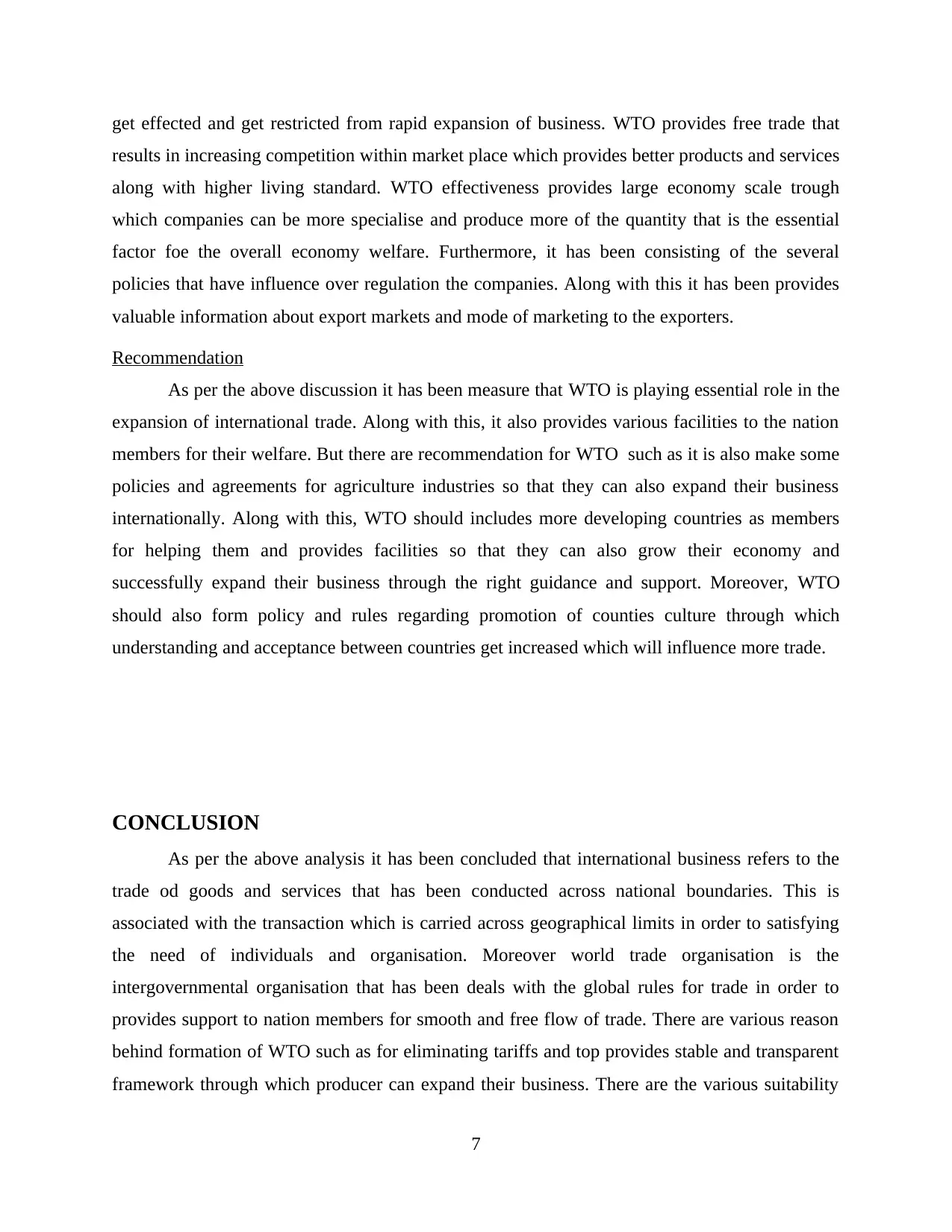
get effected and get restricted from rapid expansion of business. WTO provides free trade that
results in increasing competition within market place which provides better products and services
along with higher living standard. WTO effectiveness provides large economy scale trough
which companies can be more specialise and produce more of the quantity that is the essential
factor foe the overall economy welfare. Furthermore, it has been consisting of the several
policies that have influence over regulation the companies. Along with this it has been provides
valuable information about export markets and mode of marketing to the exporters.
Recommendation
As per the above discussion it has been measure that WTO is playing essential role in the
expansion of international trade. Along with this, it also provides various facilities to the nation
members for their welfare. But there are recommendation for WTO such as it is also make some
policies and agreements for agriculture industries so that they can also expand their business
internationally. Along with this, WTO should includes more developing countries as members
for helping them and provides facilities so that they can also grow their economy and
successfully expand their business through the right guidance and support. Moreover, WTO
should also form policy and rules regarding promotion of counties culture through which
understanding and acceptance between countries get increased which will influence more trade.
CONCLUSION
As per the above analysis it has been concluded that international business refers to the
trade od goods and services that has been conducted across national boundaries. This is
associated with the transaction which is carried across geographical limits in order to satisfying
the need of individuals and organisation. Moreover world trade organisation is the
intergovernmental organisation that has been deals with the global rules for trade in order to
provides support to nation members for smooth and free flow of trade. There are various reason
behind formation of WTO such as for eliminating tariffs and top provides stable and transparent
framework through which producer can expand their business. There are the various suitability
7
results in increasing competition within market place which provides better products and services
along with higher living standard. WTO effectiveness provides large economy scale trough
which companies can be more specialise and produce more of the quantity that is the essential
factor foe the overall economy welfare. Furthermore, it has been consisting of the several
policies that have influence over regulation the companies. Along with this it has been provides
valuable information about export markets and mode of marketing to the exporters.
Recommendation
As per the above discussion it has been measure that WTO is playing essential role in the
expansion of international trade. Along with this, it also provides various facilities to the nation
members for their welfare. But there are recommendation for WTO such as it is also make some
policies and agreements for agriculture industries so that they can also expand their business
internationally. Along with this, WTO should includes more developing countries as members
for helping them and provides facilities so that they can also grow their economy and
successfully expand their business through the right guidance and support. Moreover, WTO
should also form policy and rules regarding promotion of counties culture through which
understanding and acceptance between countries get increased which will influence more trade.
CONCLUSION
As per the above analysis it has been concluded that international business refers to the
trade od goods and services that has been conducted across national boundaries. This is
associated with the transaction which is carried across geographical limits in order to satisfying
the need of individuals and organisation. Moreover world trade organisation is the
intergovernmental organisation that has been deals with the global rules for trade in order to
provides support to nation members for smooth and free flow of trade. There are various reason
behind formation of WTO such as for eliminating tariffs and top provides stable and transparent
framework through which producer can expand their business. There are the various suitability
7
⊘ This is a preview!⊘
Do you want full access?
Subscribe today to unlock all pages.

Trusted by 1+ million students worldwide
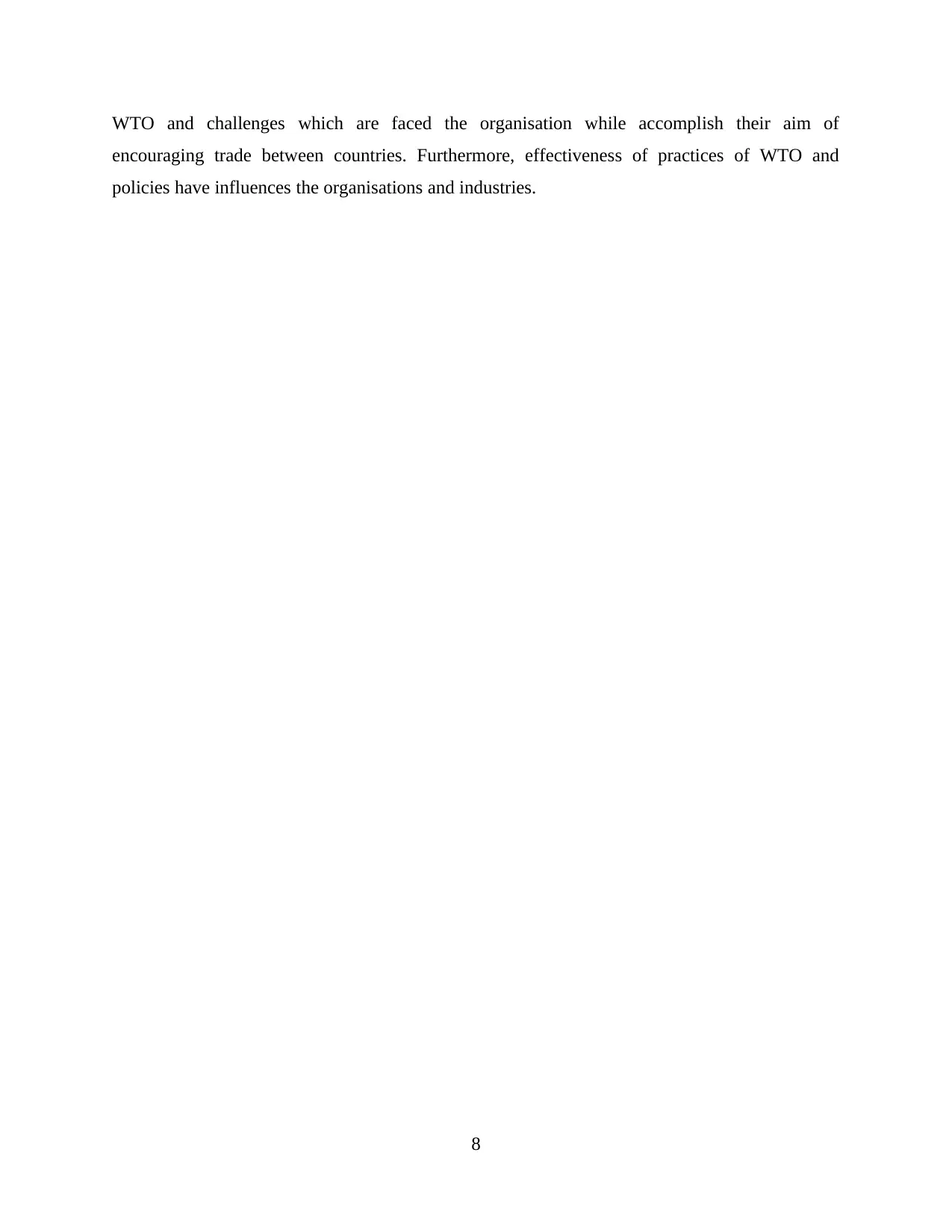
WTO and challenges which are faced the organisation while accomplish their aim of
encouraging trade between countries. Furthermore, effectiveness of practices of WTO and
policies have influences the organisations and industries.
8
encouraging trade between countries. Furthermore, effectiveness of practices of WTO and
policies have influences the organisations and industries.
8
Paraphrase This Document
Need a fresh take? Get an instant paraphrase of this document with our AI Paraphraser
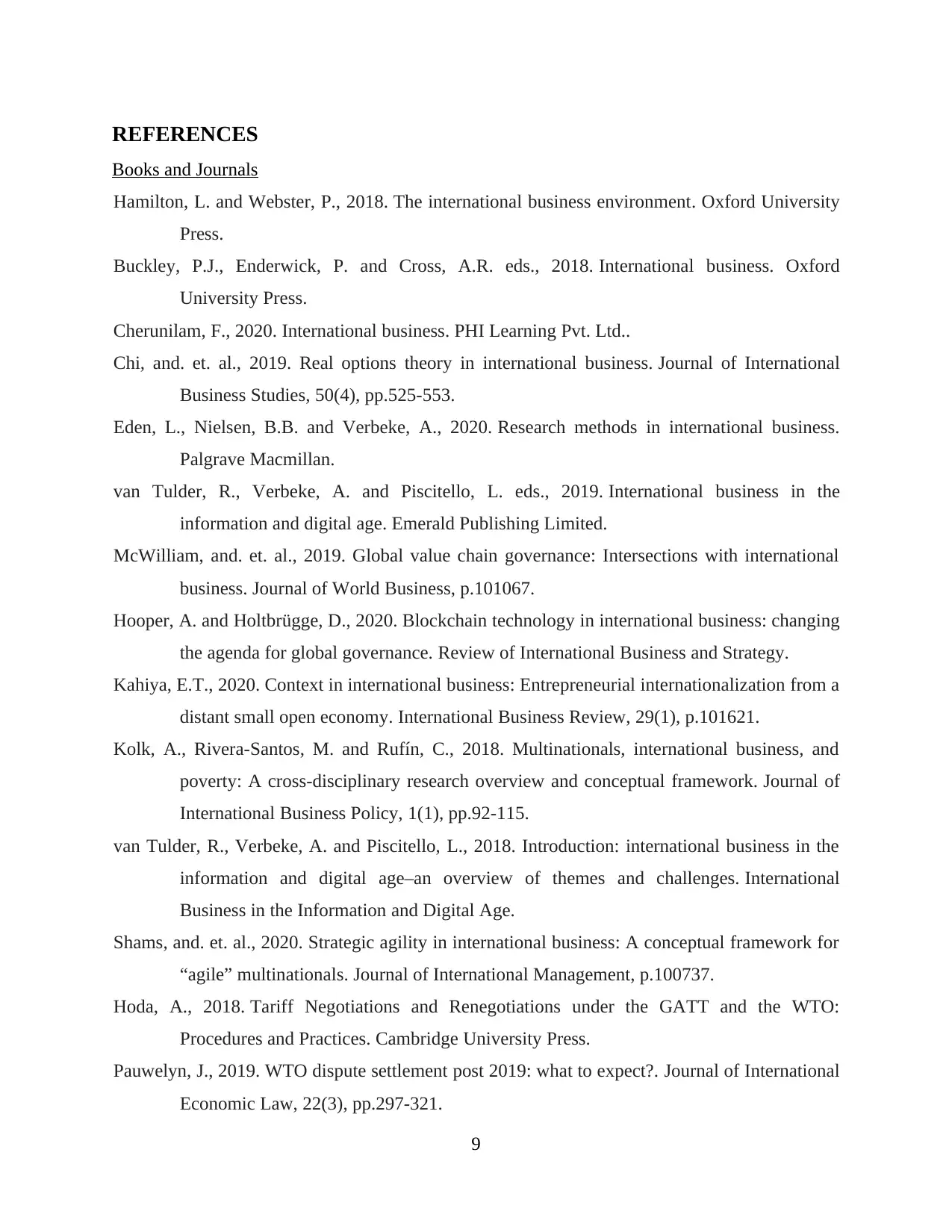
REFERENCES
Books and Journals
Hamilton, L. and Webster, P., 2018. The international business environment. Oxford University
Press.
Buckley, P.J., Enderwick, P. and Cross, A.R. eds., 2018. International business. Oxford
University Press.
Cherunilam, F., 2020. International business. PHI Learning Pvt. Ltd..
Chi, and. et. al., 2019. Real options theory in international business. Journal of International
Business Studies, 50(4), pp.525-553.
Eden, L., Nielsen, B.B. and Verbeke, A., 2020. Research methods in international business.
Palgrave Macmillan.
van Tulder, R., Verbeke, A. and Piscitello, L. eds., 2019. International business in the
information and digital age. Emerald Publishing Limited.
McWilliam, and. et. al., 2019. Global value chain governance: Intersections with international
business. Journal of World Business, p.101067.
Hooper, A. and Holtbrügge, D., 2020. Blockchain technology in international business: changing
the agenda for global governance. Review of International Business and Strategy.
Kahiya, E.T., 2020. Context in international business: Entrepreneurial internationalization from a
distant small open economy. International Business Review, 29(1), p.101621.
Kolk, A., Rivera-Santos, M. and Rufín, C., 2018. Multinationals, international business, and
poverty: A cross-disciplinary research overview and conceptual framework. Journal of
International Business Policy, 1(1), pp.92-115.
van Tulder, R., Verbeke, A. and Piscitello, L., 2018. Introduction: international business in the
information and digital age–an overview of themes and challenges. International
Business in the Information and Digital Age.
Shams, and. et. al., 2020. Strategic agility in international business: A conceptual framework for
“agile” multinationals. Journal of International Management, p.100737.
Hoda, A., 2018. Tariff Negotiations and Renegotiations under the GATT and the WTO:
Procedures and Practices. Cambridge University Press.
Pauwelyn, J., 2019. WTO dispute settlement post 2019: what to expect?. Journal of International
Economic Law, 22(3), pp.297-321.
9
Books and Journals
Hamilton, L. and Webster, P., 2018. The international business environment. Oxford University
Press.
Buckley, P.J., Enderwick, P. and Cross, A.R. eds., 2018. International business. Oxford
University Press.
Cherunilam, F., 2020. International business. PHI Learning Pvt. Ltd..
Chi, and. et. al., 2019. Real options theory in international business. Journal of International
Business Studies, 50(4), pp.525-553.
Eden, L., Nielsen, B.B. and Verbeke, A., 2020. Research methods in international business.
Palgrave Macmillan.
van Tulder, R., Verbeke, A. and Piscitello, L. eds., 2019. International business in the
information and digital age. Emerald Publishing Limited.
McWilliam, and. et. al., 2019. Global value chain governance: Intersections with international
business. Journal of World Business, p.101067.
Hooper, A. and Holtbrügge, D., 2020. Blockchain technology in international business: changing
the agenda for global governance. Review of International Business and Strategy.
Kahiya, E.T., 2020. Context in international business: Entrepreneurial internationalization from a
distant small open economy. International Business Review, 29(1), p.101621.
Kolk, A., Rivera-Santos, M. and Rufín, C., 2018. Multinationals, international business, and
poverty: A cross-disciplinary research overview and conceptual framework. Journal of
International Business Policy, 1(1), pp.92-115.
van Tulder, R., Verbeke, A. and Piscitello, L., 2018. Introduction: international business in the
information and digital age–an overview of themes and challenges. International
Business in the Information and Digital Age.
Shams, and. et. al., 2020. Strategic agility in international business: A conceptual framework for
“agile” multinationals. Journal of International Management, p.100737.
Hoda, A., 2018. Tariff Negotiations and Renegotiations under the GATT and the WTO:
Procedures and Practices. Cambridge University Press.
Pauwelyn, J., 2019. WTO dispute settlement post 2019: what to expect?. Journal of International
Economic Law, 22(3), pp.297-321.
9
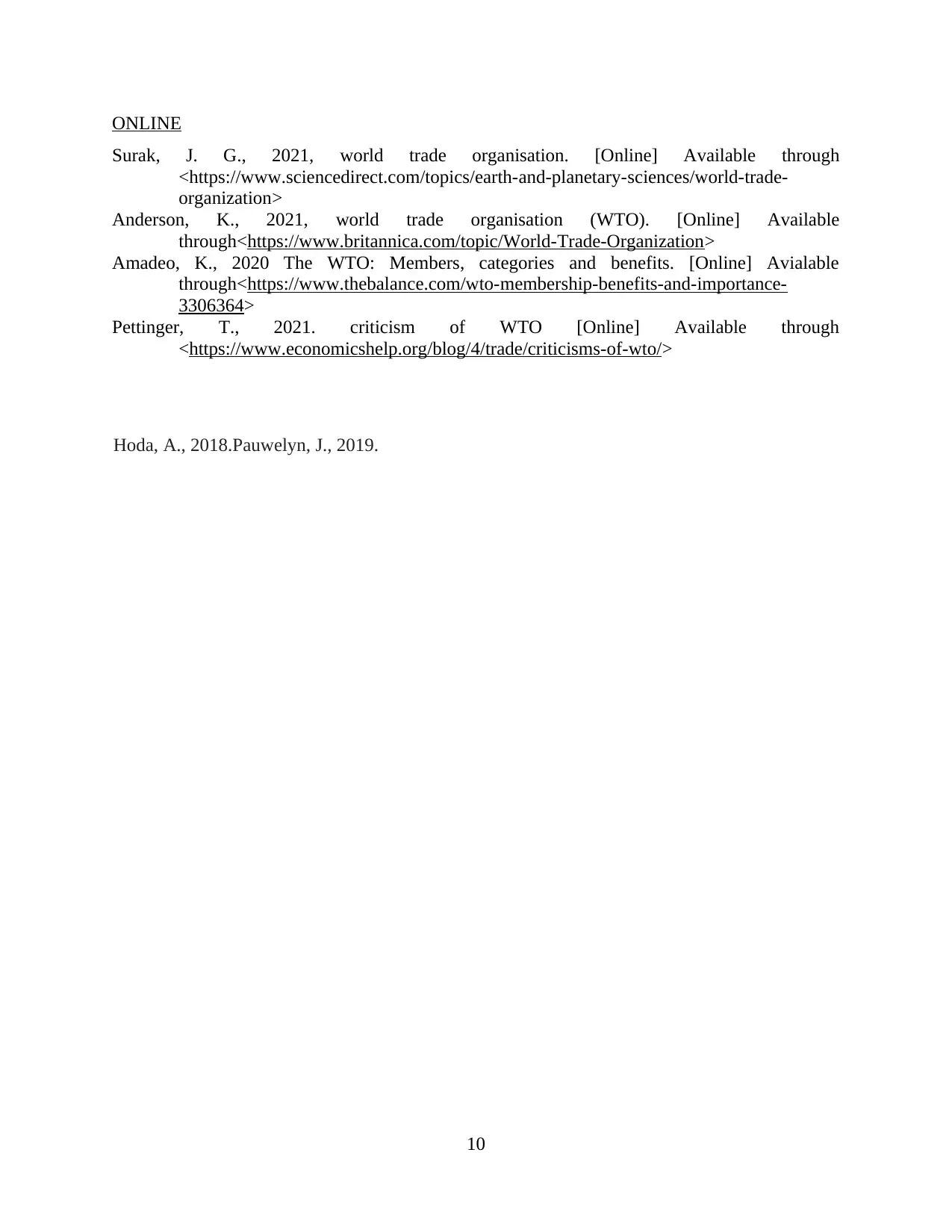
ONLINE
Surak, J. G., 2021, world trade organisation. [Online] Available through
<https://www.sciencedirect.com/topics/earth-and-planetary-sciences/world-trade-
organization>
Anderson, K., 2021, world trade organisation (WTO). [Online] Available
through<https://www.britannica.com/topic/World-Trade-Organization>
Amadeo, K., 2020 The WTO: Members, categories and benefits. [Online] Avialable
through<https://www.thebalance.com/wto-membership-benefits-and-importance-
3306364>
Pettinger, T., 2021. criticism of WTO [Online] Available through
<https://www.economicshelp.org/blog/4/trade/criticisms-of-wto/>
Hoda, A., 2018.Pauwelyn, J., 2019.
10
Surak, J. G., 2021, world trade organisation. [Online] Available through
<https://www.sciencedirect.com/topics/earth-and-planetary-sciences/world-trade-
organization>
Anderson, K., 2021, world trade organisation (WTO). [Online] Available
through<https://www.britannica.com/topic/World-Trade-Organization>
Amadeo, K., 2020 The WTO: Members, categories and benefits. [Online] Avialable
through<https://www.thebalance.com/wto-membership-benefits-and-importance-
3306364>
Pettinger, T., 2021. criticism of WTO [Online] Available through
<https://www.economicshelp.org/blog/4/trade/criticisms-of-wto/>
Hoda, A., 2018.Pauwelyn, J., 2019.
10
⊘ This is a preview!⊘
Do you want full access?
Subscribe today to unlock all pages.

Trusted by 1+ million students worldwide
1 out of 12
Related Documents
Your All-in-One AI-Powered Toolkit for Academic Success.
+13062052269
info@desklib.com
Available 24*7 on WhatsApp / Email
![[object Object]](/_next/static/media/star-bottom.7253800d.svg)
Unlock your academic potential
Copyright © 2020–2026 A2Z Services. All Rights Reserved. Developed and managed by ZUCOL.





